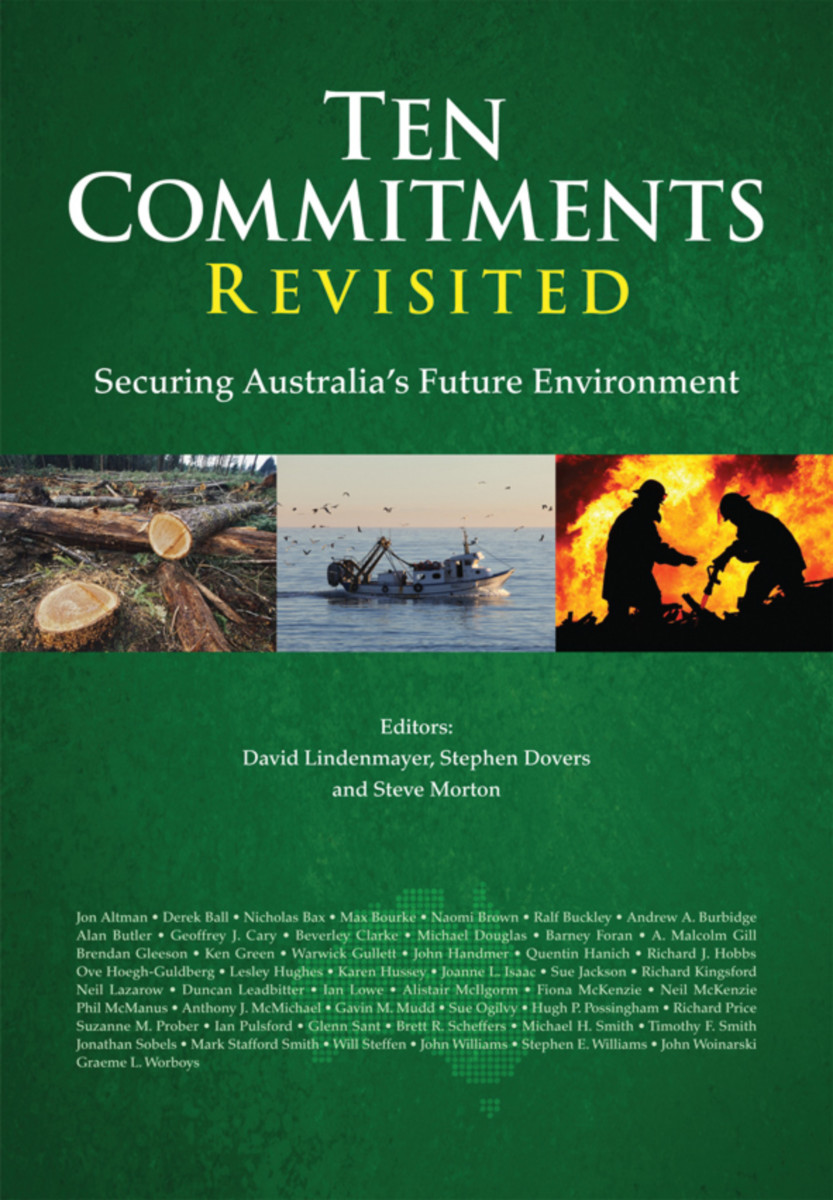EXCELLENCE IN SCIENCE PUBLISHING
Ten Commitments Revisited
Securing Australia’s Future Environment
- Publisher
CSIRO Publishing - Published
6th May 2015 - ISBN 9781486301676
- Language English
- Pages 360 pp.
- Size 6.625" x 9.625"
- Images photos, line art
What are the 10 key issues that must be addressed urgently to improve Australia’s environment?
In this follow up to the highly successful book Ten Commitments: Reshaping the Lucky Country’s Environment, Australia’s leading environmental thinkers have written provocative chapters on what must be done to tackle Australia’s environmental problems – in terms of policies, on-ground actions and research.
Chapters are grouped into ecosystems, sectors and cross-cutting themes. Topics include: deserts, rangelands, temperate eucalypt woodlands, tropical savanna landscapes, urban settlements, forestry management, tropical and temperate marine ecosystems, tropical rainforests, alpine ecosystems, freshwater ecosystems, coasts, islands, soils, fisheries, agriculture, mining, grazing, tourism, industry and manufacturing, protected areas, Indigenous land and sea management, climate change, water, biodiversity, population, human health, fire, energy and more.
Ten Commitments Revisited is a must read for politicians, policy makers, decision makers, practitioners and others with an interest in Australia’s environment.
List of contributors
Acknowledgements
Introduction
Ecosystems
1 Deserts—Steve Morton
2 Rangelands—Mark Stafford-Smith
3 Temperate woodlands—Suzanne M. Prober and Richard J. Hobbs
4 Tropical savannas—John Woinarski and Michael Douglas
5 Urban settlements—Phil McManus and Brendan Gleeson
6 Forests, forestry and forest management—David Lindenmayer
7 Tropical marine systems—Ove Hoegh-Guldburg
8 Temperate marine systems—Alan Butler and Nicholas Bax
9 Tropical forests—Stephen E. Williams, Brett R. Scheffers and Joanne L. Isaac
10 Alpine ecosystems—Ken Green
11 Freshwater ecosystems—Richard Kingsford
12 Coasts—Beverley Clarke, Timothy F. Smith and Neil Lazarow
13 Islands—John Woinarski , Derek Ball and Andrew A. Burbidge
14 Soils—Neil J. McKenzie
Sectors
15 Fisheries—Quentin Hanich, Warwick Gullett, Duncan Leadbitter, Alistair McIlgorm and Glenn Sant
16 Agriculture—Fiona McKenzie and John Williams
17 Mining—Gavin M. Mudd
18 Grazing—Richard Price and Sue Ogilvy
19 Tourism—Ralf Buckley
20 Industry—Michael H. Smith
21 Protected areas—Graeme Worboys and Ian Pulsford
Cross-cutting themes
22 Indigenous land and sea management—Jon Altman and Sue Jackson
23 Climate change—Lesley Hughes
24 Australia environment in the Anthropocene—Will Steffen
25 Water—Karen Hussey
26 Biodiversity—Hugh Possingham and David Lindenmayer
27 The private sector—Max Bourke
28 Population—Jonathan Sobels and Barney Foran
29 Sustaining Australia's health—Anthony J. McMichael
30 Landscape fires—A. Malcolm Gill and Geoffrey J. Cary
31 Emergency management—John Handmer and Naomi Brown
32 Energy—Ian Lowe
33 Policy and institutional reforms—Stephen Dovers
Synthesis and overview
David Lindenmayer, Stephen Dovers and Steve Morton
David B. Lindenmayer
Professor David B. Lindenmayer AO has worked as a researcher on Australian farms for more than 23 years. He has a particular interest in improving environmental conditions on farm properties, including protecting remnant native vegetation as well as restoring and replanting it. He specializes in establishing and maintaining ecological large-scale, long-term research and monitoring programs on farms. He has co-authored a number of other books, including Natural Asset Farming and Restoring Farm Woodlands for Wildlife.
Stephen Dovers
Stephen Dovers is a Professor and the Director of the Fenner School of Environment and Society at the Australian National University. He focuses on generic policy and institutional dimensions in environment and sustainability, combining contemporary and historical perspectives across a diverse range of sectors, most of which represent environmental dilemmas with strong justice conflicts.
Steve Morton
Dr. Steve Morton is an Honorary Professorial Fellow with Charles Darwin University. He is an ecologist who studied at the Universities of Melbourne, California, and Sydney. He joined CSIRO in Alice Springs in 1984 to work in the desert environment that has long been his focus. From 2000 until 2010, based in Canberra and Melbourne, he helped lead CSIRO as Chief of Division and Executive Team member.


